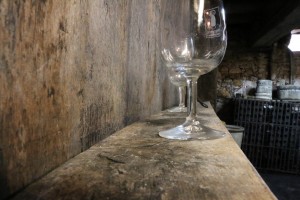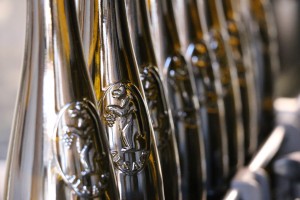Reveal the qualities of our grapes
In our opinion, the work in the vineyards is the most important for the quality and the personality of our wines. Our aim is a minimal intervention on the wines, which interestingly is way harder and needs much preventive work.
After an adapted work in the vineyards (see page Vineyards), we obtain ripe, balanced and healthy grapes, which is the needed basis.
This allows us to have an other view on the wine making process : no need to correct the “raw material”, we simply need to accompany the wines, let them live their lives while checking carefully that everything works well and keeping all our equipment perfectly clean to avoid any problems. Revealing the qualities of our grapes means two things : we don’t add anything (no sugar addition, no acidification etc), and we do everything to keep all the potential of these grapes.
The work starts by a careful hand harvest. We put the grapes whole in the press, with no crushing in order to preserve the purety of the aromas. For the same reason, the pressing is smooth and long.
The juice stays for one night in a stainless steel vat, in order to clarify. The clear juices are then pumped in our old oak casks. All the life of the wines will take place in these casks : the fermentation and then the aging on lees. These casks will allow some oxygen threw the wood, which is important for the evolution of the wine. But they don’t bring any tannins nor oak taste, because they are over 100 years old.
The fermentation starts with wild yeasts present in our cellar and on the grapes. Once the fermentation is launched, we have three types of process :
- To obtain a dry wine, we let the wines ferment until they have totally consumed their sugar. The fermentations take a lot of time (between 3 months and 11 months) thanks to our low-vigorous vineyards, giving a low-nutrient juice : the yeasts work slowly. The absence of added yeasts permit to respect this rhythm. Thank to this slow fermentation, we keep the fine lees in suspension for a longer period, giving to the wine some complexity and resistance to the oxygen thus its aging potential. The CO2 produced by the fermentation avoids any oxygen contact with the wine during the fermentation process : thanks to this we don’t need to add any sulfites during the cask-aging. After the fermentation, the wine clarifies naturally, it is then bottled with very low or no sulfites. The unsulfited wines are also not filtered, the others are only lightly filtered.
- For the sweet wines, we leave the fermentation take place until they reach the right balance. Ideally, the fermentation stops from itself when the wine is balanced. If not, we cool down the wines and take out the active lees to help stopping the fermentation. We then let them clarify and only then we ad a low dose of sulfites to make sure that the fermentation doesn’t start again. We then age these wines 6 months on their fine lees. At bottling, wines are filtered carefully in order to avoid a second fermentation in bottles.
- For the reds, we are destemming the grapes at harvest. Then we let the berries macerate in th juice during the fermentation, for 8 to 15 days. The skin is giving the color and the tannins to the wine. We then separate the juice from the berries, and leave the wines age for 10 more months. Then they clarify naturally and are simply bottled without any sulfites nor filtration.
Our wine-making methods are certified organic and Vinabio, a strict Alsatian chart ( Vinabio link)


